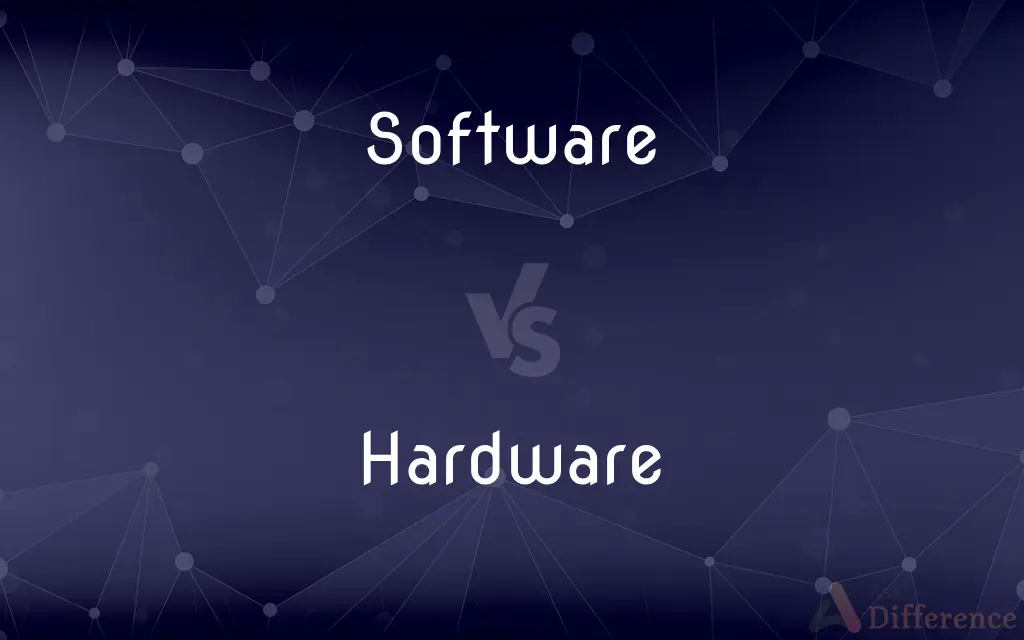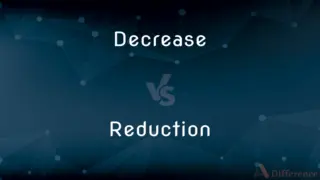Software vs. Hardware — What's the Difference?
By Tayyaba Rehman & Urooj Arif — Updated on April 22, 2024
Software refers to the programs and operating information used by a computer, while hardware is the physical components of a computer system.

Difference Between Software and Hardware
Table of Contents
ADVERTISEMENT
Key Differences
Software encompasses all the digital instructions that command a computer’s hardware to perform specific tasks. It includes applications and operating systems that make computers usable for everything from complex calculations to simple data entry. On the other hand, hardware refers to the tangible components such as processors, memory devices, and motherboards that are essential for a computer to function.
The development and function of software are dependent on programmers and can be easily modified or updated without physical changes. Whereas, hardware requires physical manufacturing and modification, making updates or changes more involved and typically requiring physical replacement or alteration of components.
Software can exist in various formats including installed programs, cloud-based services, and mobile apps, thus offering flexibility and scalability depending on the user’s needs. In contrast, hardware is limited by its physical form and capabilities, and upgrades or changes often involve substantial cost and physical adjustments.
User interaction with computers is predominantly through software interfaces, which can be tailored for ease of use and personalized experiences. Hardware, however, interacts with the software and requires the user to understand some level of physical operation or installation, which may not be as frequently modified.
The cost implication of software is generally for licensing and maintenance, which can be recurring depending on the software model. Hardware costs, meanwhile, involve upfront investment for purchase and potential ongoing costs for power and maintenance, generally incurring higher initial expenses.
ADVERTISEMENT
Comparison Chart
Nature
Non-tangible, digital programs and operating info
Tangible, physical components like chips, boards
Modification
Can be updated or changed digitally
Often requires physical replacement
Interaction
Through user interfaces, highly customizable
Direct physical interaction or installation
Cost
Licensing, possibly subscription-based
Upfront purchase, maintenance
Examples
Operating systems, apps, databases
CPUs, hard drives, RAM
Compare with Definitions
Software
Operating System.
Windows 10 manages computer hardware and software resources.
Hardware
Hard Drive.
A 1TB hard drive stores files permanently.
Software
Application Software.
Microsoft Word is used for document creation.
Hardware
RAM.
16GB of RAM allows your computer to run multiple applications at once.
Software
System Software.
BIOS helps start the computer up.
Hardware
Motherboard.
The motherboard houses the CPU and memory.
Software
Middleware.
Apache Tomcat connects databases and applications.
Hardware
CPU.
Intel Core i7 processes most of the computer’s data.
Software
Freeware.
Google Chrome offers web browsing without cost.
Hardware
Graphics Card.
NVIDIA GTX 1080 renders high-definition graphics smoothly.
Software
Software is a collection of instructions and data that tell a computer how to work. This is in contrast to physical hardware, from which the system is built and actually performs the work.
Hardware
Metal goods and utensils such as locks, tools, and cutlery.
Software
The programs, routines, and symbolic languages that control the functioning of the hardware and direct its operation.
Hardware
(Computers) A computer and the associated physical equipment directly involved in the performance of data-processing or communications functions.
Software
(computing) Encoded computer instructions, usually modifiable (unless stored in some form of unalterable memory such as ROM).
Hardware
Machines and other physical equipment directly involved in performing an industrial, technological, or military function.
Software
(military) The human beings involved in warfare, as opposed to hardware such as weapons and vehicles.
Hardware
(Informal) Weapons, especially military weapons.
Software
(computer science) written programs or procedures or rules and associated documentation pertaining to the operation of a computer system and that are stored in read/write memory;
The market for software is expected to expand
Hardware
Fixtures, equipment, tools and devices used for general-purpose construction and repair of a structure or object. Also such equipment as sold as stock by a store of the same name, e.g. hardware store.
He needed a hammer, nails, screws, nuts, bolts and other assorted hardware, so he went to the hardware store.
Hardware
(informal) Equipment.
Military hardware
Hardware
(computing) The part of a computer that is fixed and cannot be altered without replacement or physical modification; motherboard, expansion cards, etc. Compare software.
Hardware
(technology) Electronic equipment.
Hardware
Metal implements.
The designers have put their logo on the hardware of this bag here.
Hardware
(slang) A firearm.
Hardware
(slang) Medals or trophies.
Hardware
(Philippines) hardware store
Hardware
Ware made of metal, as cutlery, kitchen utensils, and the like; ironmongery.
Hardware
Any of the physical objects used in carrying out an activity, in contrast to the knowledge, skill, or theory required to perform the activity; mostly used collectively.
Hardware
The sum of all the physical objects, such as the electrical, mechanical, and electronic devices which comprise a computer system; as, the typical PC hardware suite consists of a mainboard and a number of peripherals such as hard drives and speakers, connected by adapter cards, but the input and output from users occurs mostly through the keyboard and monitor; contrasted with software, the programs executed by the computer.
Hardware
The weapons, transport, and other physical objects used in conducting a war.
Hardware
Weapons, especially handguns, carried on the person; as, check your hardware at the door before entering.
Hardware
Major items of military weaponry (as tanks or missile)
Hardware
Instrumentalities (tools or implements) made of metal
Hardware
(computer science) the mechanical, magnetic, electronic, and electrical components making up a computer system
Common Curiosities
Can hardware work without software?
Hardware needs software to perform specific tasks beyond basic functioning.
How does software interact with hardware?
Software sends instructions that hardware executes to perform tasks.
Can software operate without hardware?
No, software requires hardware to function.
What are examples of computer software?
Operating systems, applications, and utilities.
What is software?
Software refers to the programs and systems that operate a computer.
What is hardware?
Hardware encompasses the physical components of a computer.
Can I switch software easily on my computer?
Yes, different software applications can be installed or removed based on user needs.
What is firmware?
Firmware is a specialized type of software that provides low-level control for hardware.
How do I update my computer’s software?
Software updates can typically be downloaded and installed from the internet.
What are examples of computer hardware?
CPUs, motherboards, RAM, and hard drives are typical examples.
Which is more expensive, hardware or software?
Initially, hardware usually involves higher costs, but software can be expensive over time due to licensing fees.
Is it easy to replace computer hardware?
Some components like RAM and hard drives are easier to replace than others like CPUs.
How do I upgrade my computer’s hardware?
Hardware upgrades often involve physically replacing components.
Share Your Discovery

Previous Comparison
Reticulocyte vs. Erythrocyte
Next Comparison
Decrease vs. ReductionAuthor Spotlight
Written by
Tayyaba RehmanTayyaba Rehman is a distinguished writer, currently serving as a primary contributor to askdifference.com. As a researcher in semantics and etymology, Tayyaba's passion for the complexity of languages and their distinctions has found a perfect home on the platform. Tayyaba delves into the intricacies of language, distinguishing between commonly confused words and phrases, thereby providing clarity for readers worldwide.
Co-written by
Urooj ArifUrooj is a skilled content writer at Ask Difference, known for her exceptional ability to simplify complex topics into engaging and informative content. With a passion for research and a flair for clear, concise writing, she consistently delivers articles that resonate with our diverse audience.













































